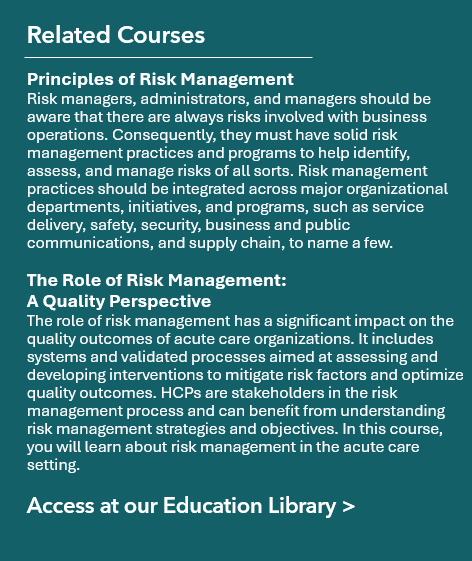In the complex landscape of healthcare, where unpredictable medical outcomes can introduce significant risks, a robust risk-management program isn’t merely advisable, it’s essential.
Healthcare professionals and executives understand well the mental and emotional toll of handling claims, which can suck up time and headspace for years before a decision on proceeding to trial is even made. Recognizing the substantial benefits of a structured risk-management program not only mitigates such challenges, but it also improves the efficiency and reputation of a medical practice.
The Evolution of Risk Management in Healthcare

Traditionally perceived as a punitive and reactive measure, risk management in healthcare has evolved. It has shifted from merely managing crises as they occur to proactively preventing them. This evolution is underscored by a switch from a hierarchical to a more collaborative approach within healthcare settings, encouraging an environment where staff feel safer and more valued when contributing to discussions on patient safety and process improvements.
Physicians Insurance (PI) has been pivotal in this transformation, promoting a non-punitive, supportive partnership with its Members. By integrating services such as comprehensive risk assessments—from general hospital evaluations to specific reviews like for obstetrics or emergency medicine—Physicians Insurance provides a solid foundation for institutions to build safer, more reliable practices.
Building Trust and Open Communication
A critical element in modern risk management is to create a culture of trust and openness. Hospitals and clinics are urged to develop environments where staff can report incidents without fear of retribution. This trust-building helps foster discussions about near-misses and safety concerns, which help drive learning and improvement.
Instances of this can be seen in how some Physicians Insurance Members have reshaped their risk-management strategies. They’ve adopted practices such as managerial rounding and established stronger communication channels within their teams. This approach not only helps staff identify “rocks in the shoe”—persistent issues that bother them—but also engages them in developing solutions, thereby making them active participants in the culture of safety.
The Paybacks of Investing in Risk Management
Investing in risk management does more than reduce the likelihood of claims—it leads to a positive organizational culture. This in turn creates a number of other benefits:
- Enhanced Community Reputation: Effective risk-management strategies can significantly enhance a medical practice’s standing within the community by showcasing a commitment to patient safety and quality care.
- Reduced Claims Exposure: A proactive approach to risk management can diminish the frequency and severity of claims, thus keeping insurance premiums more stable and predictable.
- Improved Staff Morale and Retention: When staff feel that their concerns are heard and addressed, it boosts morale and decreases turnover rates. They are more likely to stay with an institution that values their safety and well-being as much as patient care.
- Financial Savings: Effective risk-management strategies lead to lower costs associated with claims and litigation and prevent adverse events, yielding substantial financial savings.
 Our Role in Supporting Risk Management
Our Role in Supporting Risk Management
Physicians Insurance provides more than just insurance. We offer a partnership that spans every aspect of risk management. With resources ranging from on-site risk assessments to educational programs and customizable tools, Physicians Insurance supports its Members in establishing robust risk-management frameworks that are tailored to their specific needs. In some instances, we can provide annual risk evaluations that provide insight for our Members into claim trends, at both the local and national levels.
These services are confidential and designed to integrate seamlessly into existing operations, ensuring that Members get the support they need without feeling overseen or controlled. This approach helps maintain the autonomy of an institution while providing it with the backup needed to handle potential risks effectively.
The Future of Healthcare Risk Management
In the years to come, the healthcare risk-management landscape is set to evolve further with advances in technology and changes in healthcare policies. The focus will increasingly shift toward predictive analytics, where data is used not just to react to past events, but also to predict and prevent future risks. This will require a continuous investment in risk-management programs to keep pace with technological advancements and emerging health threats.
The value of proactive risk management in healthcare is paramount. By investing in comprehensive risk management, healthcare providers can ensure a safer environment for their patients and staff, reduce the likelihood of costly claims, and enhance their overall operational efficiency. As the role of risk management continues to grow, it becomes an indispensable part of modern healthcare practice. Physicians Insurance remains dedicated to supporting its Members through this journey, providing the tools, resources, and expertise they need to navigate the complexities of healthcare risks successfully. This commitment not only protects a medical practice, but it also contributes to the health and safety of the community it serves.